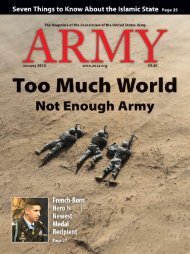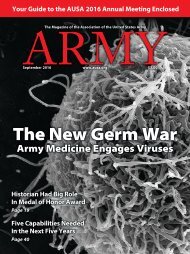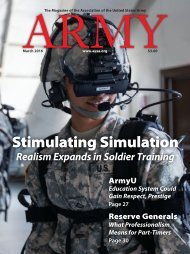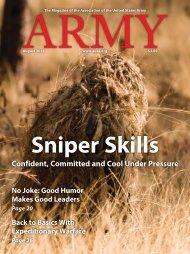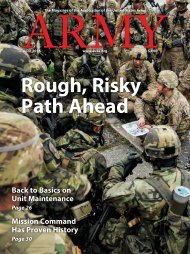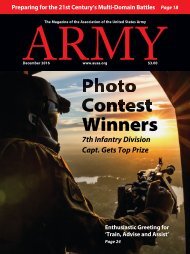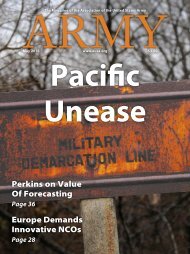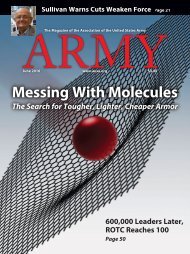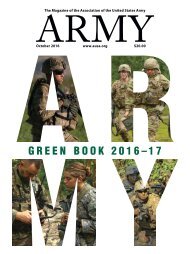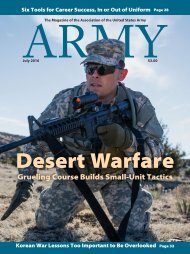Army - Kicking Tires On Jltv
You also want an ePaper? Increase the reach of your titles
YUMPU automatically turns print PDFs into web optimized ePapers that Google loves.
Deep Roots of the <strong>Army</strong>’s<br />
Before 1901, the <strong>Army</strong> didn’t pay much attention<br />
to soldiers’ teeth. In order to serve<br />
during the Civil War, <strong>Army</strong> recruits simply<br />
had to have six opposing upper and lower<br />
teeth to bite off the tough paper powder cartridges<br />
that were used in muzzle-loading rifles. By 1900,<br />
those wishing to serve in the <strong>Army</strong> had to have only<br />
four teeth—the minimum number required to chew<br />
food. Ironically, the nation’s first commanding general,<br />
George Washington, had only one real tooth<br />
when he was sworn in as president.<br />
Despite repeated pleas dating from the Civil War<br />
for <strong>Army</strong> dentists, the idea was largely ignored.<br />
Congress was finally forced to enact legislation creating<br />
an <strong>Army</strong> Dental Corps in 1901 as a result of<br />
the Spanish-American War. American soldiers campaigning<br />
in Spain’s tropical colonies such as Cuba,<br />
the Dominican Republic and the Philippines were<br />
confronted with extraordinary dental problems.<br />
According to Dr. John Sayre Marshall, the <strong>Army</strong>’s<br />
first dental surgeon, soldiers who served in these<br />
tropical environments experienced climate conditions<br />
and “changes in the habits of life” that were<br />
“enervating and debilitating to the general system.”<br />
Marshall noted that as a result, the soldiers’ resistance<br />
to disease was “greatly lessened,” consequently<br />
predisposing them to dental diseases.<br />
$150 per Month<br />
Initially, Congress authorized 30 dental positions<br />
that paid $150 per month as well as free housing.<br />
About 1,000 civilian dentists applied. The legislation<br />
provided that the dentists would not be actual soldiers<br />
but “contract dentists,” with a pay grade equivalent to<br />
a first lieutenant. The reason for this was that many in Congress<br />
were skeptical about the need for dentists at all. The compromise<br />
that was reached was an experiment to determine if a dental<br />
corps was a useful adjunct to the <strong>Army</strong>.<br />
Those chosen were obligated to work seven hours a day for<br />
the <strong>Army</strong>. After that, they could work up to two additional<br />
hours to treat soldiers’ families and civilian employees, charging<br />
the regular fee. Military dependents were not covered under<br />
the legislation.<br />
Marshall assigned the successful candidates to various posts<br />
around the nation and overseas from his headquarters at the<br />
Presidio of San Francisco. Newspapers reported that each<br />
dentist was provided with a “kit of operating machinery …<br />
costing in the neighborhood of $300.” The operating machinery<br />
and other dental paraphernalia were the same as what was<br />
found in offices of the “highest class of dentists in civil life,”<br />
with the exception of the dental chair. The dentist’s chair was<br />
“a folding article of furniture and therefore portable.” Marshall<br />
bragged they were so light that they could be carried on the<br />
Tooth extraction in 1898 during the Spanish-American War<br />
backs of two mules. (In 1901, the <strong>Army</strong> was not mechanized.)<br />
By 1903, in the Annual Reports of the War Department for the<br />
Fiscal Year Ended June 30, 1902, Marshall was able to report a<br />
remarkable success story: “The services of the Dental Corps<br />
have been highly appreciated by officers and enlisted men of<br />
the Regular and Volunteer Armies,” he wrote, adding that the<br />
dental corps relieved “a great amount of acute suffering” and<br />
was able to “conserve a large number of teeth and restore them<br />
to a healthy condition, thus almost immediately returning to<br />
duty many cases that were previously carried for several days<br />
upon the company sick report … greatly reducing the loss of<br />
valuable time to the service, incident to diseases of the mouth,<br />
teeth and jaws.”<br />
Officer Dentists Authorized<br />
From the moment he took office, Marshall fought for the<br />
inclusion of dentists within the officers’ ranks. He finally attained<br />
his dream in 1911, when Congress authorized a dental<br />
corps made up of officers. He was the first dentist commis-<br />
Library of Congress<br />
40 ARMY ■ February 2016




